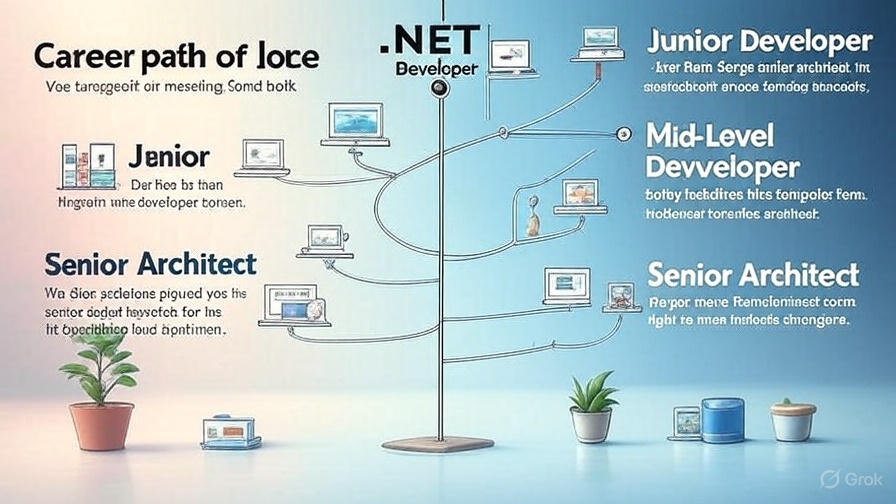Career Path of a .NET Developer: From Junior to Architect
Embarking on a career as a .NET developer offers a dynamic and rewarding journey. The path from a junior developer to a .NET architect is filled with continuous learning, skill enhancement, and professional growth. This article explores the various stages in the career path of a .NET developer, highlighting the key milestones, skills, and experiences required to advance from a junior role to an architectural position.
To start your journey, consider enrolling in a comprehensive .net course that covers the fundamentals and advanced concepts of .NET development. Additionally, familiarizing yourself with common .net core interview questions can give you a competitive edge in your job search and help you prepare for technical interviews.
Understanding the Role of a .NET Developer
A .NET developer is responsible for designing, developing, and maintaining software applications using the .NET framework. This role involves writing clean, efficient code, debugging and testing applications, and collaborating with other team members to deliver high-quality software solutions. .NET developers work with various programming languages such as C#, VB.NET, and F#, and utilize tools and technologies like ASP.NET, Entity Framework, and Azure.
Junior .NET Developer: The Starting Point
Responsibilities and Expectations
As a junior .NET developer, your primary responsibility is to assist senior developers in coding, testing, and debugging applications. You will be expected to write basic code, fix bugs, and perform unit testing. This stage is crucial for building a strong foundation in .NET development and understanding the software development lifecycle.
Skills and Knowledge
To excel as a junior .NET developer, you should have a solid understanding of the .NET framework, proficiency in C#, and familiarity with SQL and database management. Additionally, knowledge of web development technologies like HTML, CSS, and JavaScript is beneficial. Soft skills such as communication, teamwork, and problem-solving are equally important.
Learning and Growth
Continuous learning is key to advancing your career. Take advantage of online courses, workshops, and certifications to enhance your skills. Engage in coding challenges and contribute to open-source projects to gain practical experience. Seek mentorship from senior developers and actively participate in code reviews to improve your coding practices.
Mid-Level .NET Developer: Building Expertise
Responsibilities and Expectations
As a mid-level .NET developer, you will take on more complex tasks and responsibilities. This includes designing and implementing software solutions, optimizing application performance, and mentoring junior developers. You will be involved in the entire software development lifecycle, from requirements gathering to deployment and maintenance.
Skills and Knowledge
At this stage, you should have a deep understanding of the .NET framework and advanced proficiency in C#. Knowledge of design patterns, architectural principles, and best practices is essential. Familiarity with cloud technologies like Azure and experience with DevOps practices such as continuous integration and continuous deployment (CI/CD) are valuable assets.
Learning and Growth
To progress to the next level, focus on expanding your knowledge of advanced .NET technologies and frameworks. Explore topics like microservices architecture, containerization, and serverless computing. Participate in hackathons, attend industry conferences, and join professional networks to stay updated with the latest trends and innovations in .NET development.
Senior .NET Developer: Leading the Way
Responsibilities and Expectations
As a senior .NET developer, you will play a leadership role in the development team. Your responsibilities include designing and architecting complex software solutions, making critical technical decisions, and ensuring the overall quality and performance of applications. You will also mentor and guide junior and mid-level developers, fostering a culture of continuous learning and improvement.
Skills and Knowledge
Senior .NET developers should possess extensive experience and expertise in .NET development. Proficiency in advanced C# concepts, architectural patterns, and cloud technologies is crucial. Strong problem-solving skills, the ability to analyze and optimize application performance, and excellent communication and leadership skills are essential for success in this role.
Learning and Growth
To advance to an architectural role, focus on developing your architectural and design skills. Gain experience in system design, scalability, and security. Explore advanced topics like domain-driven design, event-driven architecture, and distributed systems. Pursue certifications in cloud technologies and architectural frameworks to demonstrate your expertise and commitment to professional growth.
.NET Architect: The Pinnacle of the Career Path
Responsibilities and Expectations
As a .NET architect, you will be responsible for designing and overseeing the implementation of large-scale, enterprise-level software solutions. Your role involves making high-level technical decisions, defining architectural standards and best practices, and ensuring the scalability, security, and performance of applications. You will collaborate with stakeholders, development teams, and other architects to deliver innovative and robust software solutions.
Skills and Knowledge
.NET architects should have a deep understanding of software architecture principles, design patterns, and best practices. Proficiency in advanced .NET technologies, cloud platforms, and DevOps practices is essential. Strong leadership, communication, and problem-solving skills are crucial for success in this role. Additionally, knowledge of emerging technologies and trends in software development is valuable for staying ahead in the field.
Learning and Growth
Continuous learning and professional development are key to maintaining your expertise as a .NET architect. Stay updated with the latest advancements in .NET technologies, cloud computing, and software architecture. Participate in industry events, contribute to open-source projects, and share your knowledge through blogs, articles, and presentations. Seek opportunities to mentor and guide other developers, fostering a culture of innovation and excellence.
Conclusion
The career path of a .NET developer is a journey of continuous learning, skill enhancement, and professional growth. From a junior developer to a .NET architect, each stage offers unique challenges and opportunities for advancement. By building a strong foundation, expanding your knowledge, and developing your leadership and architectural skills, you can achieve success and make a significant impact in the field of .NET development.
FAQs
What is the role of a .NET developer?
A .NET developer is responsible for designing, developing, and maintaining software applications using the .NET framework. This includes writing code, debugging and testing applications, and collaborating with team members to deliver high-quality software solutions.
What skills are required to become a junior .NET developer?
To become a junior .NET developer, you should have a solid understanding of the .NET framework, proficiency in C#, and familiarity with SQL and database management. Knowledge of web development technologies like HTML, CSS, and JavaScript is also beneficial.
How can I advance from a junior .NET developer to a mid-level developer?
To advance from a junior to a mid-level .NET developer, focus on continuous learning and skill enhancement. Take advantage of online courses, workshops, and certifications. Engage in coding challenges, contribute to open-source projects, and seek mentorship from senior developers.
What are the responsibilities of a senior .NET developer?
A senior .NET developer plays a leadership role in the development team. Responsibilities include designing and architecting complex software solutions, making critical technical decisions, and ensuring the overall quality and performance of applications. Mentoring and guiding junior and mid-level developers is also a key aspect of this role.
What skills are essential for a .NET architect?
A .NET architect should have a deep understanding of software architecture principles, design patterns, and best practices. Proficiency in advanced .NET technologies, cloud platforms, and DevOps practices is essential. Strong leadership, communication, and problem-solving skills are crucial for success in this role.
How can I stay updated with the latest trends in .NET development?
To stay updated with the latest trends in .NET development, participate in industry events, contribute to open-source projects, and join professional networks. Follow blogs, articles, and presentations by industry experts and engage in continuous learning through online courses and certifications.
What is the importance of mentorship in the career path of a .NET developer?
Mentorship plays a crucial role in the career path of a .NET developer. Seeking guidance from senior developers and actively participating in code reviews can help improve coding practices and accelerate professional growth. Mentoring junior developers also fosters a culture of continuous learning and improvement.
What are some advanced topics to explore for career growth in .NET development?
Advanced topics to explore for career growth in .NET development include microservices architecture, containerization, serverless computing, domain-driven design, event-driven architecture, and distributed systems. Gaining experience in these areas can enhance your skills and open up new opportunities for advancement.
How can I demonstrate my expertise as a .NET developer?
To demonstrate your expertise as a .NET developer, pursue certifications in advanced .NET technologies, cloud platforms, and architectural frameworks. Contribute to open-source projects, share your knowledge through blogs and articles, and participate in industry events and hackathons.
What is the future outlook for .NET developers?
The future outlook for .NET developers is promising, with a growing demand for skilled professionals in the field. Advancements in cloud computing, artificial intelligence, and the Internet of Things (IoT) are creating new opportunities for .NET developers. Continuous learning and staying updated with the latest trends and technologies are key to success in this dynamic and evolving field.






